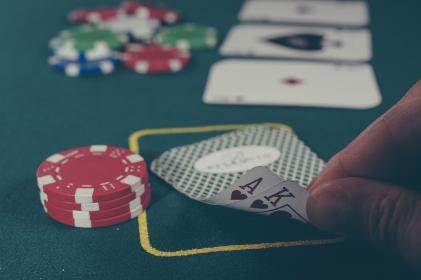Throughout poker‘s two-century lifespan, it has grown from a criminal pastime to a well-respected sport. As the game continues to evolve and more new players get into it, more and more misinformation also circulates. These range from half-truths to outright lies, and some get surprisingly accepted by a large portion of poker’s casual player base. There are also misconceptions common among people who watch poker but don’t play it. This poker guide aims to clear up all those misunderstandings by identifying a few common poker falsehoods that you may mistakenly believe.

Poker is a game of chance
One of the biggest misunderstandings among people who haven’t played poker is that it is purely based on chance. On the contrary, much like other competitive sports, the results of a poker game are heavily influenced by skill and strategy.
As Doyle Brunson famously put it in his poker strategy book Super/System: “Poker isn’t a game of cards. It’s a game of people.” Not every game is decided by the quality of your hand; bluffing and adapting your strategy to your opponents allows you to win more than just relying on luck. Good and bad luck will also even out over time, leaving skill as the one factor deciding your long-term profits.
Being a poker pro is easy
Many people think being a professional poker player is simple. With no boss, high payouts, and a large degree of personal freedom, being a poker pro looks incredibly appealing. Not enough people understand the true challenges of poker as a career. Yes, it does come with a lot of flexibility and potential reward. However, it demands a lot from you too. You need to be exceptionally good at the game for big payouts; “luck” won’t cut it, as poker is a game of skill and not chance.
Beyond being good at the game, professional poker also requires insane mental fortitude, particularly if you focus on tournaments. Variance, the poker term for chance affecting your wins or losses, is ever-present. Even the best players can experience rough downswings, which are unfortunately compounded by the tournament reward structure. You need to have the bankroll management skills to handle these swings and the endurance not to let their emotions affect their play.
Online poker gives more bad beats
One of the most common online poker misconceptions is that you experience more bad beats playing online. This is absolutely untrue. Online poker is a highly competitive industry; why would poker sites rig their games and make you want to choose a competitor? The reason this myth is so widely believed is likely a combination of negativity bias and online poker’s faster pace.
With the faster pace of online poker, you can play more hands per hour, inevitably leading to more bad beats. Since people usually remember negative experiences far more than positive or neutral ones, this can create the illusion that online poker creates more bad beats. In reality, the distribution between bad beats and regular games is the same; you just remember the bad beats more than other games.

Poker’s all about bluffs
Another prevalent misconception by people who watch poker is that the game revolves around bluffing. They bluff too often and get punished, trying to play poker as they see on TV. From dramatized shows to depictions of poker in movies like Rounders, poker in mainstream media tends to focus on bluffs.
They are by far the most exciting part of the game, so it makes sense for them to be the focal point for the audience. However, this is not at all accurate to real-life poker. Even the most aggressive poker pros play intelligently; players don’t wildly try to bluff every chance they get.
Poker’s all about physical tells
Like thinking poker’s all about bluffing, another pretense about the game is how much physical tells matter in live games. Many players see physical tells as an unbeatable strategy that basically allows you to see your opponents’ cards. In reality, physical tells are more of an art form than a legitimate strategic concept.
They can be used effectively, but there aren’t hard-and-fast rules. Every player is different, so physical tells aren’t all there is to live poker. The creation of online poker has also pushed the game further towards optimized strategy over reading finicky cues.
Freeroll poker games are a great way to learn
Starting your poker journey by playing freeroll games with play money seems like a no-risk way to learn the ropes, so much so that it’s often touted as advice by some. However, inexperienced players may find they are not getting as accurate an idea of the game as hoped.
Players without real stakes often take risks they would not take under more serious conditions, making it challenging to understand player dynamics properly. It’s impossible for freeroll games to accurately represent the real deal, so you shouldn’t treat them as a way to practice. Low-stakes games can easily be found online, so you shouldn’t let financial constraints scare you into playing freerolls.

Did you believe any of these myths?
Having a clearer understanding of the common misconceptions surrounding poker will benefit any player. Knowing the reality behind these myths can help you stay focused on advancing your knowledge, skill, and performance in any game you play.
So, with these misconceptions cleared, feel free to play online poker, knowing that you have all the facts to excel at the game. Remember that practice makes perfect, and good luck at the tables!